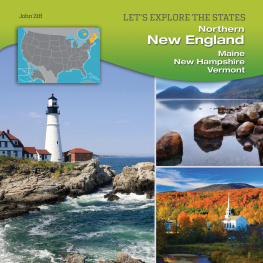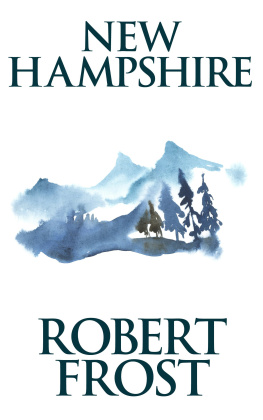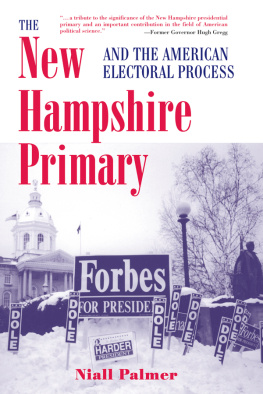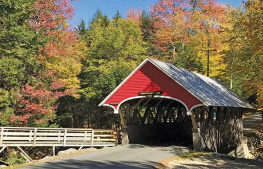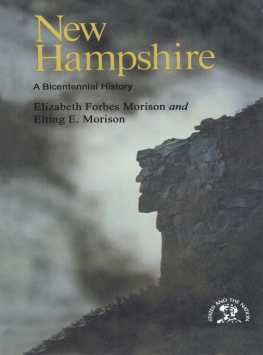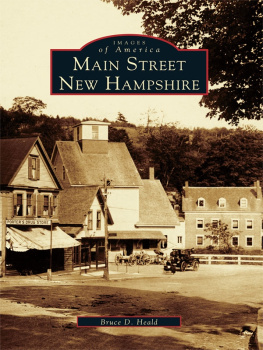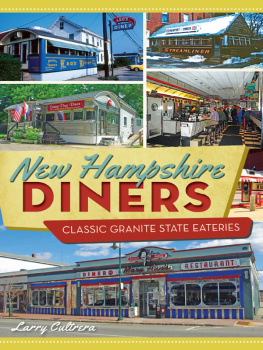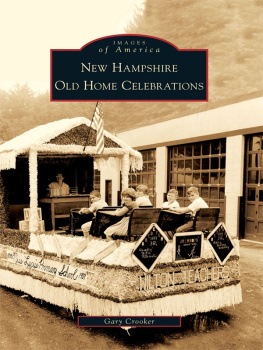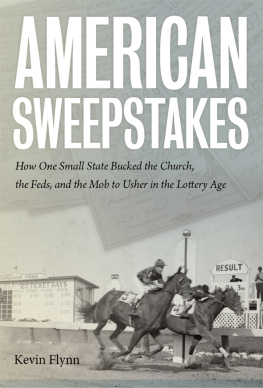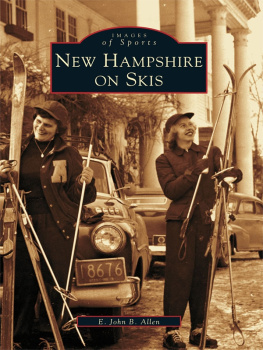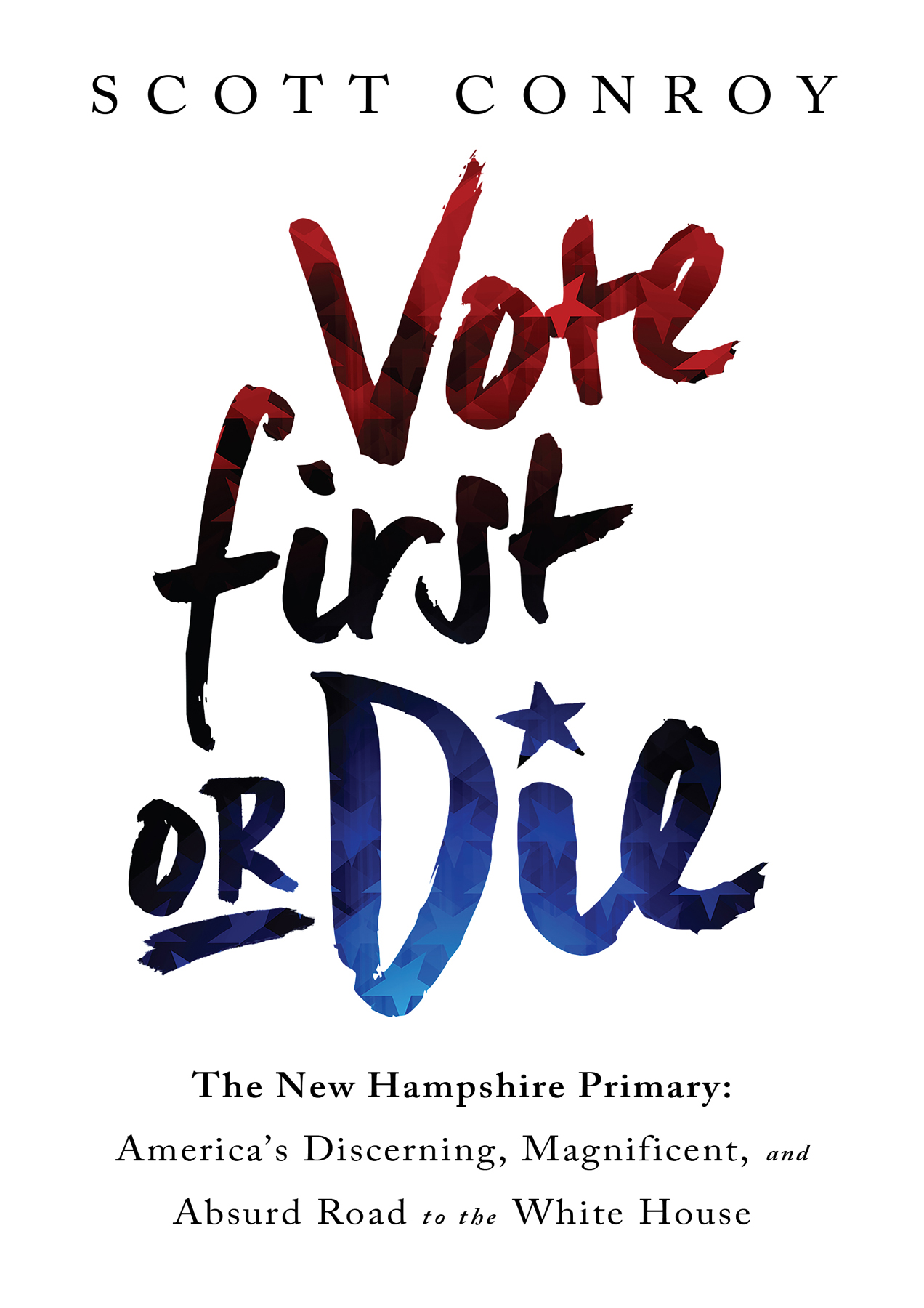Copyright 2017 by Scott Conroy
Published by PublicAffairs, an imprint of Perseus Books, LLC, a subsidiary of Hachette Book Group, Inc.
All rights reserved.
No part of this book may be reproduced in any manner whatsoever without written permission except in the case of brief quotations embodied in critical articles and reviews. For information, address PublicAffairs, 1290 Avenue of the Americas, New York, NY 10104.
PublicAffairs books are available at special discounts for bulk purchases in the U.S. by corporations, institutions, and other organizations. For more information, please contact the Special Markets Department at Perseus Books, 2300 Chestnut Street, Suite 200, Philadelphia, PA 19103, call (800) 810-4145, ext. 5000, or e-mail special.markets@perseusbooks.com.
Book Design by Jack Lenzo
Library of Congress Cataloging-in-Publication Data
Names: Conroy, Scott, author.
Title: Vote first or die : the New Hampshire primary : Americas discerning, magnificent, and absurd road to the White House / Scott Conroy.
Description: 1 | New York : PublicAffairs, 2017. | Includes bibliographical references and index.
Identifiers: LCCN 2016046367 (print) | LCCN 2016054865 (ebook) | ISBN 9781610395816 (hardback) | ISBN 9781610395823 (ebook)
Subjects: LCSH: PrimariesNew Hampshire. | BISAC: POLITICAL SCIENCE / Political Process / Elections. | HISTORY / United States / State & Local / New England (CT, MA, ME, NH, RI, VT). | POLITICAL SCIENCE / Civics & Citizenship.
Classification: LCC JK2075.N42 C66 2017 (print) | LCC JK2075.N42 (ebook) | DDC 324.2742/0154dc23
LC record available at https://lccn.loc.gov/2016046367
First Edition
E3-20170306-JV-NF
For my wife, Jo, who made New Hampshire important
A S A POLITICAL REPORTER who abhors the cynical nature of modern presidential campaigns, Ive at times considered a career change. Maybe Id find myself surrounded by less duplicitous characters, Ive sometimes thought, if I joined the bank-robbing trade. Or perhaps I could work in a more civilized environment, if I were to become a poisonous-snake wrangler. So why then did I decide to immerse myself even further in the largely distasteful world of presidential politics by writing a book about it in the summer of 2014? In short, its because Ive long thought of New Hampshire as a small but essential island of virtue and discernment adrift in the vast sea of contemptibility that consumes our public life every four years.
The inaugural New Hampshire presidential primary took place in 1916, and the state has held the nations first such contest every four years since 1920. But that historically singular role is only part of the reason that New Hampshire is special. New Hampshirites engage in politics with the all-encompassing zeal that residents of other states dedicate to football or church. One reason for this passion is that a tremendously high percentage of New Hampshires citizens are themselves elected officials. Composed of 424 members, the General Court of New Hampshire is the largest state legislature in the country. With about 3,000 New Hampshire residents for every legislator, the equivalent level of participation in California would require a statehouse of 12,780 lawmakers in Sacramento. New Hampshire legislators are paid a hundred bucks a year and receive no perks of any apparent psychological or material value. Suffice it to say, they dont do it for the recognition. And when presidential primary season rolls around, the grip that the campaign maintains over this tiny state is impossible to escape, even for those who might prefer to do so. The people of New Hampshire know how important their votes are, and they act accordingly.
But isnt it that way in Iowa, too? Why not write about the Hawkeye Statethe real kickoff to the presidential election? Since 1972, the Iowa caucuses have been first on the calendar, beating New Hampshire to the punch every time. Without Iowa, there would have been no President Barack Obama, and the state has its own quirky political cultureone thats well worth exploring. On a personal level, I love Iowa. The Iowa State Fair is perhaps the only place on earth where fried butter on a stick is considered a reasonable lunch option, and if the people there were any nicer, youd wonder if the tap water was laced with ecstasy. But as far as the political culture goes, Iowa is just not the same as New Hampshire.
Theres a reason New Hampshire tends to garner equal time, more or less, from the candidates and the media in the lead-up to the voting every four years, even though the nations first primary falls after the Iowa caucuses. The perception, earned over many decades, is that New Hampshire is the sober adult in the room left to clean up the mess that the unruly children of Iowa often make. Although its an oversimplification, like many stereotypes this one is founded in some truth. For one thing, the process in Iowa is intentionally exclusive, as the caucuses can take a couple of hours out of a voters day. The process in Iowa is also far more susceptible to shenanigans. In 2012, I sat inside a Republican caucus site outside of Des Moines and watched a little old lady shuffle from caucus-goer to caucus-goer, collecting crinkled up pieces of scrap paper and dropping them into a bucket. These were what passed for secure ballots, and though I didnt see her lose any of them, it didnt strike me as a particularly error-proof method of conducting a presidential election. And if you care at all about the sanctity of the secret ballot, you dont even want to hear about how the Iowa Democrats do it. Participants in the Democratic caucuses have to announce their votes publicly by standing in a designated area where they try to cajole supporters of other candidates to join them. Then, caucus-goers whose preferred candidate doesnt receive at least 15 percent of their precincts vote are shit out of luckbarred entirely from having their support for their candidate of choice recorded. Once that little bit of disenfranchisement is complete, the backers of the candidates who did meet the so-called viability threshold resume their temporary roles of unscrupulous flea-market vendors, trying to convince the loser-backers to come over to their side. Its madness. Compelling madness for political reporters, no doubt, but madness nonetheless.
New Hampshire conducts its primary in a more straightforward way: campaigns cut a check to the state for a thousand bucks and then Democrats vote in one primary, Republicans in another, and independents can choose to participate in either one. The polls close, the votes are tallied, and the results are announced. Its a streamlined process that makes sense. The difference between New Hampshire and Iowa is like the difference between an Olympic wrestling match and a World Wrestling Entertainment fight.
In 2016, more than 358,000 people participated in the Iowa caucuses, including a record-shattering 186,932 Republicans. But amid this unusually robust turnout, that still meant that only about 17 percent of Iowas more than 2 million registered voters bothered to show up on Caucus Day. In New Hampshire, by contrast, 542,433 people cast ballots in the 2016 primarythe highest number ever, and an overall turnout rate of 52.4 percent of its voting-eligible population. No other state saw a majority of qualified voters participate in its primary or caucus in 2016, with the average turnout around the country at about 30 percent. Yet again, New Hampshires level of participation was higher than in any other state, all without such conveniences as early voting or vote-by-mail that residents elsewhere enjoy.


